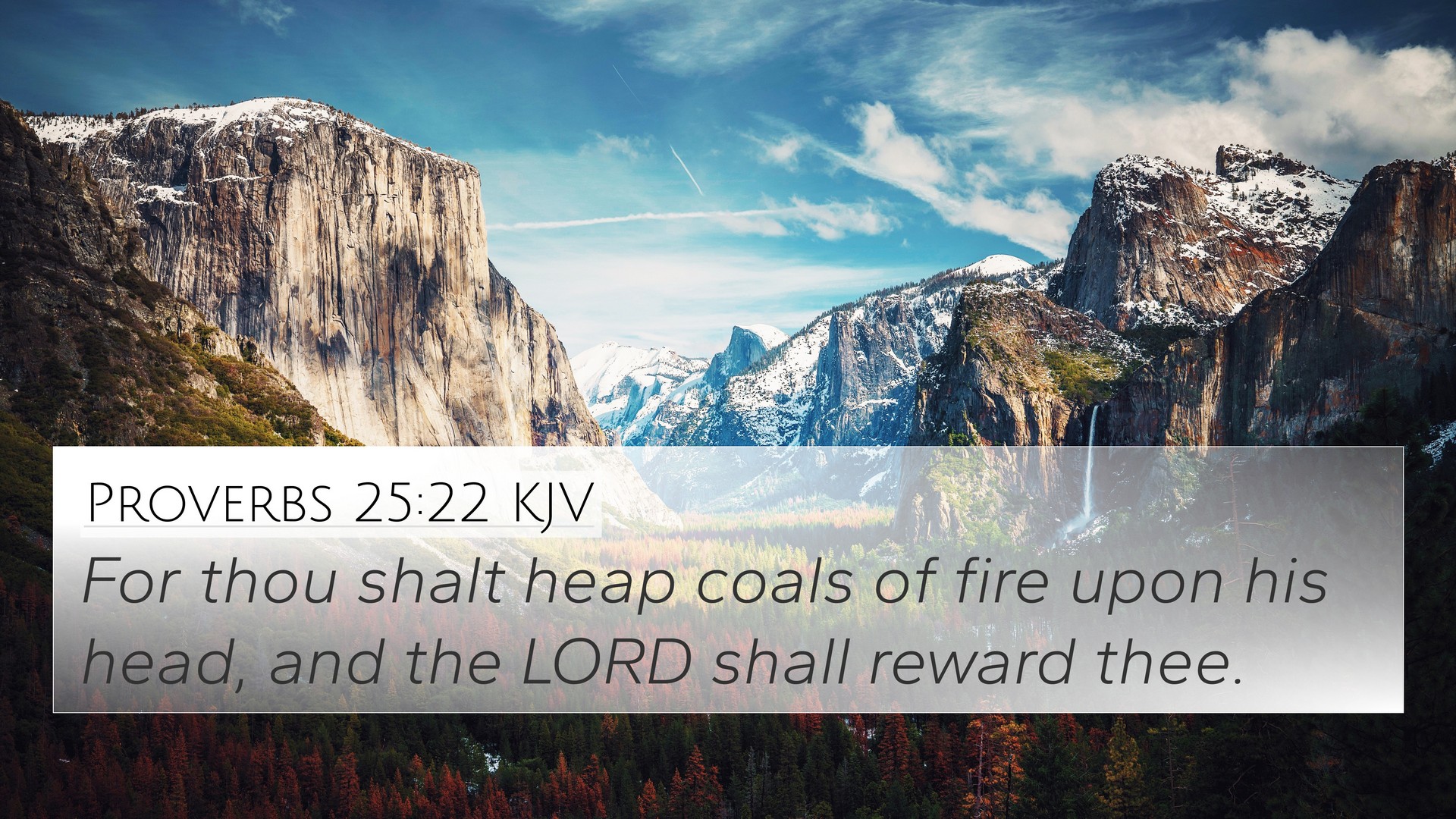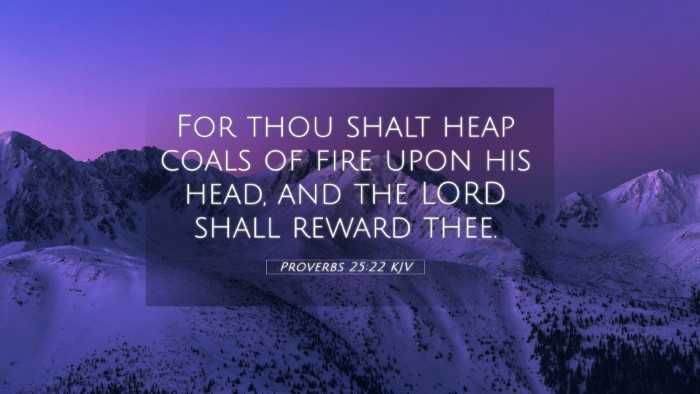Understanding Proverbs 25:22
Proverbs 25:22 states, "For thou shalt heap coals of fire upon his head, and the Lord shall reward thee." This verse conveys a profound message about the moral repercussions of benevolence and the divine principles governing human relationships. Below we explore the interpretations from renowned public domain commentaries, focusing on the deeper meaning and the connections to other biblical texts.
Meaning and Interpretation
According to Matthew Henry, this passage speaks to the concept of overcoming evil with good. When one shows kindness or love to an enemy, it can lead them to greater shame and repentance, signified by the "coals of fire." This metaphor signifies both purification and the igniting of sorrow within the one receiving the kindness.
Albert Barnes elaborates on this metaphor, suggesting that the act of kindness towards those who wrong us may lead them to reflect upon their actions and feel regret. He emphasizes that kindness is not merely an ethical suggestion but comes with divine rewards, reinforcing God's justice and recompense.
Adam Clarke further adds that this verse illustrates the power of love and mercy in confronting hostility. He contrasts worldly wisdom with divine wisdom, suggesting that our natural response often leans toward retaliation rather than benevolence. The "coals of fire" serve as a reminder that acts of kindness can bear profound results both for the giver and the recipient.
Biblical Cross-References
This verse can be cross-referenced with several other scriptures that teach similar themes of kindness, mercy, and divine retribution. Here are some key cross-references:
- Romans 12:20-21: "Therefore if thine enemy hunger, feed him; if he thirst, give him drink..." This directly parallels the message of mercy towards enemies.
- Matthew 5:44: "But I say unto you, Love your enemies, bless them that curse you..." reinforcing Jesus’ teachings on loving one’s adversaries.
- Luke 6:35: "But love your enemies, and do good, and lend, hoping for nothing again; and your reward shall be great..." echoing the theme of divine reward for unforeseen kindness.
- Proverbs 15:1: "A soft answer turneth away wrath: but grievous words stir up anger." This illustrates how gentle responses can diffuse hostility.
- Exodus 23:4-5: "If thou meet thine enemy's ox or his ass going astray, thou shalt surely bring it back to him again..." demonstrating the principle of restoring good even to one who wrongs us.
- Galatians 6:9: "And let us not be weary in well doing: for in due season we shall reap, if we faint not." This aligns with the promise of eventual divine reward for righteous actions.
- James 1:20: "For the wrath of man worketh not the righteousness of God." Helping us understand that our responses should align more closely with God's righteousness than with human impulses.
Thematic Connections
This verse prompts readers to consider broader themes within the Bible concerning interpersonal behavior and divine justice. The following themes are found throughout scripture:
- Overcoming Evil with Good: Represented in various instances throughout both the Old and New Testaments.
- Divine Reward: The assurance that God's justice involves rewarding righteous behavior.
- The Power of Forgiveness: Illustrating the transformative effect of forgiveness on both the forgiver and the forgiven.
- Mercy and Compassion: The overarching biblical principle that emphasizes mercy as a divine attribute that humanity should emulate.
Conclusion
Proverbs 25:22 invites deep reflection on our response to others, especially those who may oppose us. As emphasized by various scholars, the verse encourages benevolence even in adversity, suggesting that such actions can lead to regret in others and brings rewards from the Lord. The full richness of this scripture can be better understood through thematic connections and cross-referencing with other verses that illustrate similar ideas.
In studying this verse, one can consider the array of tools available for Bible cross-referencing, such as concordances and study guides, which facilitate a deeper understanding of scriptural connections. Engaging in cross-referencing Bible studies enriches one’s biblical literacy and enhances one's personal faith journey.





